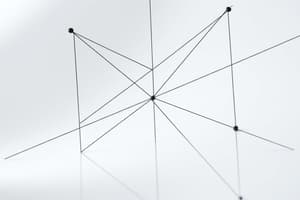Podcast
Questions and Answers
What are the three kinds of statements used to organize geometry?
What are the three kinds of statements used to organize geometry?
Definitions, postulates, and theorems
Two straight lines can cross each other in more than one point.
Two straight lines can cross each other in more than one point.
False (B)
What is the formula for the circumference of a circle?
What is the formula for the circumference of a circle?
C = 2πr
What kind of line is always indicated when the term 'line' is used in geometry?
What kind of line is always indicated when the term 'line' is used in geometry?
A ______ is a perfectly flat surface, extending infinitely far in all directions.
A ______ is a perfectly flat surface, extending infinitely far in all directions.
Which of the following is an undefined term in geometry?
Which of the following is an undefined term in geometry?
What visual representation is commonly used to depict a plane in geometry?
What visual representation is commonly used to depict a plane in geometry?
Flashcards are hidden until you start studying
Study Notes
Common Sense and Exact Reasoning
- Geometry consists of various figures like triangles, squares, rectangles, circles, and cubes.
- Formulas for calculating perimeters, areas, and volumes are commonly known but may not always seem obvious.
An Organized Logical Development of Geometry
- Geometry can be systematically organized using definitions, postulates, and theorems.
- Definitions clarify geometric concepts, while theorems require logical proofs to establish their validity.
- Postulates are fundamental statements accepted without proof and create a foundation for proving other statements.
Undefined Terms
- Certain basic geometric concepts such as point, line, and plane are introduced as undefined terms.
- A point can be visualized as an extremely small dot, which covers no area.
- A straight line is represented as an infinitely extending entity, often illustrated with arrowheads to indicate infinite length.
- Line segments are defined as portions of a line with endpoints, similar to a stretched string.
- A plane is characterized as a flat surface extending infinitely in all directions, analogous to a transparent sheet of glass with no thickness.
Characteristics of Geometric Ideas
- Points have no area, lines have no width, and planes have no thickness, emphasizing their abstract nature.
- Visual representations can aid in understanding these concepts but will always be approximations.
Theorems and Logical Proofs
- Theorems are proven through established facts and previously proved assertions.
- The first theorem proven must stand on its own, as there are no prior theorems to rely on.
Studying That Suits You
Use AI to generate personalized quizzes and flashcards to suit your learning preferences.




